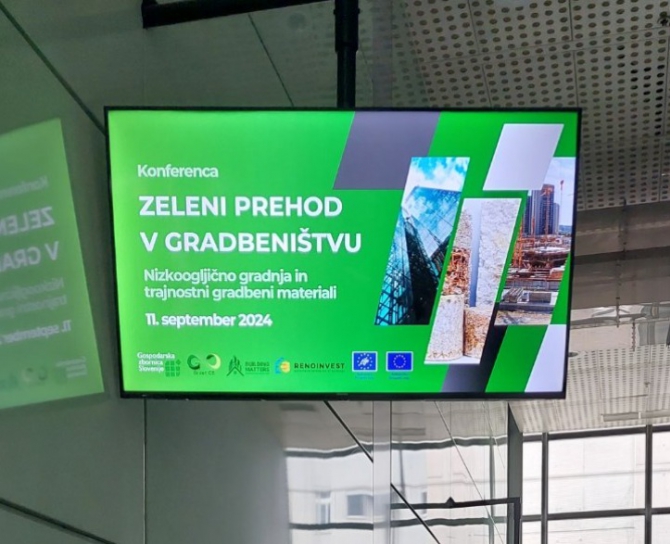

Keynote presentations and Part 1: The Materials Cycle and Low Carbon Construction
In the first part of the event, Anja Kodrič from the Building Research Institute of Slovenia presented the CirCon4Climate project, where a catalogue of examples of circular, reusable building materials and low-carbon products was prepared. The use of construction waste as an alternative source of materials was also explored, with a special focus on geopolymers as an environmentally friendly alternative to cement and lime.
Vladimir Gumilar from the Slovenian Construction Cluster then highlighted the challenges in commercialising advanced and sustainable materials in projects such as STOREPET, HEATLAND and STEELPROST. Among the current solutions, he presented the development of a lighter, sound-absorbing asphalt that heats less. He highlighted a pilot project in Murcia, Spain, where an alternative asphalt layer was used in an urban centre to improve sound absorption and reduce surface overheating. Despite the technical success, commercial partners have not yet been found to expand the project.
Leni Pernar from the Ministry of Natural Resources and Spatial Planning then presented a new information platform for the eco-labelling of construction products, which will support transparency and public awareness of the life cycles of construction materials and allow contractors to access key environmental information. The platform will build on a new legislative framework that will require environmental verification of materials in new buildings and promote the use of wood and other sustainable resources.
Part Two: Financing and international opportunities for the green transition
In the second part, Alenka Bea Logar Pučnik from the Chamber of Commerce and Industry presented the GREET CE project, which provides support to SMEs in developing smart and green innovations, focusing on the less developed regions of Central Europe and Portugal. The project promotes cooperation between regions in developing pilots for eco-construction, digital energy and regenerative agriculture and gases.
In addition, Filip Bobek from Eleutheria presented the possibilities of financing sustainable projects, both at national and European level. He highlighted the possibilities to benefit from European programmes that support co-development and innovative partnerships between companies.
Nina Vrabelj from the Chamber of Commerce and Industry further presented national financial incentives for the green transition, while Filip Bobek detailed the process of realising business ideas and the challenges in obtaining funding for green projects.
Part 3: Smart investments and building renovation - RENOINVEST activities
The last part of the event was dedicated to building renovation projects and RENOINVEST activities, where Dr Sabina Jordan from the Building Research Institute of Slovenia presented the results of a SWOT analysis revealing challenges in energy renovation, such as fragmentation of decision makers, mistrust in new technologies and lack of funding. She also presented the necessary adjustments to legislation and highlighted the need for better public awareness of the benefits of energy renovation.
Jure Vetršek from IRI UL presented useful lessons learned from various projects, including innovative approaches to reuse of materials and industrial renovation of buildings. He paid special attention to the RE-MODULEES project, a platform for promoting energy-efficient renovation of buildings, and highlighted the importance of involving social scientists in building projects.
Erik Potočar from the Ministry of Environment, Climate and Energy drew attention to the new requirements and conditions of calls for tenders for co-financing of buildings and the importance of involving local communities and citizens in the design of energy-efficient buildings.
The event concluded with an interesting discussion on public policies and proposals for measures to promote low-carbon building renovation, where Boštjan Udovič from the Chamber of Commerce and Industry ZPN presented concrete proposals to improve the financial frameworks and conditions for the successful implementation of sustainable projects in the future.
The event was a successful platform for the exchange of knowledge and experience between different stakeholders in the construction industry, with a focus on sustainable solutions and innovations that are key to the future of the construction industry.
Please see the original news and the presentations here:



